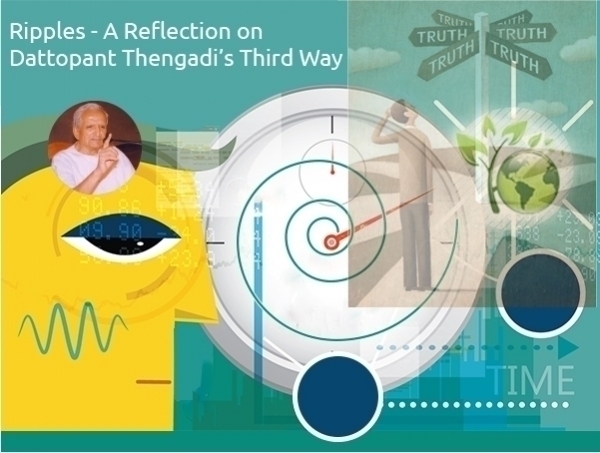Ripples A Reflection On Dattopant Thengadi's Third Way - Part 22
Vivekananda did not accept western standards as the model of progress and development.
Total Views |
I have been reflecting in my own way on Dattopant Thengadi Ji's Third Way. I present these small "ripples" that it has caused in my mind in a series. I am glad it has found its resonance in many thinking minds alike. I hope the readers have read the earlier article in the series before moving ahead.
Vivekananda did not accept western standards as the model of progress and development. Obviously many Indian intellectuals didn't agree with him. He was labeled as a revivalist.
They could not perceive the self contradictions of the Western theory of materialism. ( The points in support of this statement are not given, but one can see that the quest of material things ultimately falls short of treating it as the only goal of life.) The concepts like renaissance and revival were not understood with sufficient clarity.
Unlike materialistic west, Hindu philosophy focused on mind and matter equally. Thus shaping mind was given importance, as without it no rights can be garunteed in any society. Many thinkers ( Indian thinkers mainly) too recognise the importance of moulding minds i.e. 'samskaras'. It prepares man to restrain. For many Hindu schools of thought Mind and matter are two 'facets of the same coin'. They don't exclude the other. Thus there is unity in the apparent divirsity ( There are many Hindu and western theories that explain the role of mind and matter. These theories define the objectives of life too.)
Probably on the similar lines, Nationalism is basically not to be contrasted with Internationalism. The world would be enriched by contribution of different cultures, they result into a coherent picture. And every individual though different too contributes to the whole in a meaningful way. They all are made aware of their duties. Duty is a frame of reference for all this, they are not in conflict with the social good or with nature too.
When developing countries blindly tried to tread on the path of development given by the west or developed countries, it resulted in 'cultural rootlessness and corruption of politics'. Again Dattopant makes reference to Ivan Illich who describes it as 'modernisation of poverty' .
Without any social control on science , we board a train ' leading to unknown destination'. ( Scientist Ralf Lap)
Dattopant notes that western model failed to 'ensure stability and security for even the developed countries'. He states that Indian way of looking at this complex social phenomena would be the right path to tread upon. ( Arnold Toynbee too supports this statement in his writings openly. The reference is given in the article) He believes that Bharat has play the role of showing the path of 'aparigraha that is non possession,restrained consumption', being duty oriented and establishing harmony between an individual on one hand and society and nature on the other.


